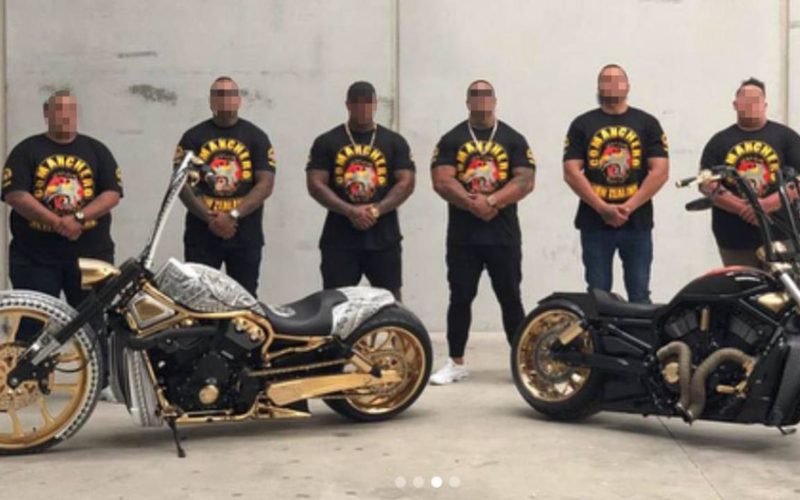The trust account of an Auckland lawyer was used to launder millions of dollars’ worth of luxury cars, cash and real estate for the vice president of the Comancheros and other members of the motorcycle club.
Tyson Daniels – who is second-in-command of the clubs’s Auckland chapter – and Andrew Simpson, a lawyer, were sentenced in the High Court at Auckland this morning after pleading guilty to money laundering charges late last year.
A charge of participating in an organised criminal group between May 2017 and April 2019 was also admitted by Daniels, a 30-year-old who was living in the affluent Auckland suburb of Mellons Bay until his arrest in April.
The nine money laundering charges for Daniels came from purchasing a swag of expensive vehicles.
There were four Range Rovers – with price tags of $175,000, $255,000, $218,000 and $280,000 – a $200,000 Mercedes Benz, a Lamborghini for $285,000, and two Rolls-Royces which cost $364,000 and $595,000.
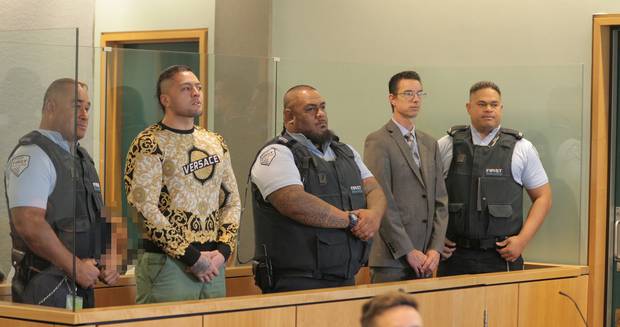
The luxury fleet was seized in April when police raided Daniels and other members of the Comanchero, as well as associates, following a year-long investigation codenamed Operation Nova.
Yet, just one month after his arrest, Daniels purchased another Mercedes Benz for $215,000 while he was on bail and another $247,000 was found in the home.
“Arrogant” was how Crown prosecutor David Johnstone described the offending on bail.
The police allege the Comancheros, an Australian motorcycle club which set up shop in New Zealand after a number of senior members were deported here, are behind significant drug smuggling linked to a Mexican cartel.
Daniels was not charged with any drug offences. He was convicted and remanded in custody until his sentencing this morning.
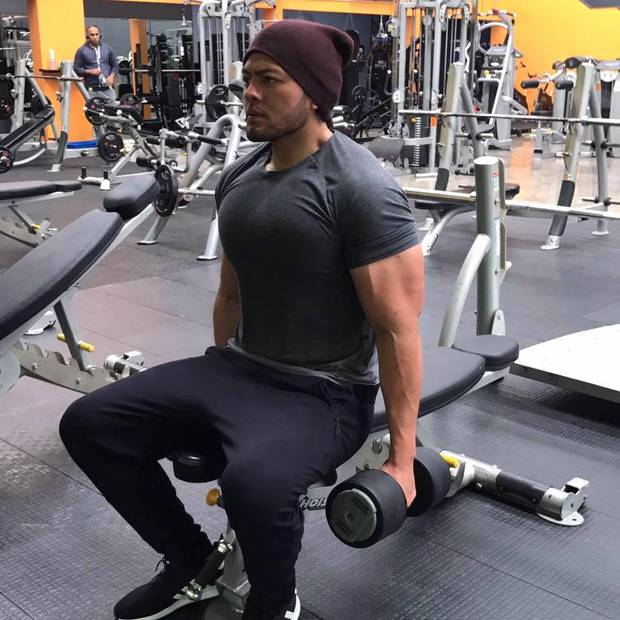
In sentencing Daniels – who was wearing a black and gold Versace top – to four years and eight months years in prison, Justice Gerard van Bohemen said the senior club member played a crucial role overseeing the gang’s operations for significant personal gain.
The offending was sophisticated, said Justice van Bohemen, with encrypted devices used to avoid detection by police.
Money was deposited at banks in amounts less than $10,000, in a bid to avoid triggering the banks’ reporting threshold, then funelled through trust and company accounts to disguise their criminal origins.
“You clearly knew the money was derived from significant importation of drugs.”
Also appearing in the High Court today, was the Auckland lawyer who helped Daniels – and allegedly others – launder money on behalf of the Comancheros.
In November, Andrew Neill Simpson pleaded guilty to 13 charges of money laundering – crimes he committed while a solicitor at a private legal practice in Auckland’s west.
More than $1.2m in cash was deposited into Simpson’s trust account at his law , which was also used to purchase some of the cars belonging to Daniels and allegedly others in the club, as well as real estate such as a $1.3m home in Auckland.
The lawyer was convicted and released on bail until his sentencing this morning.
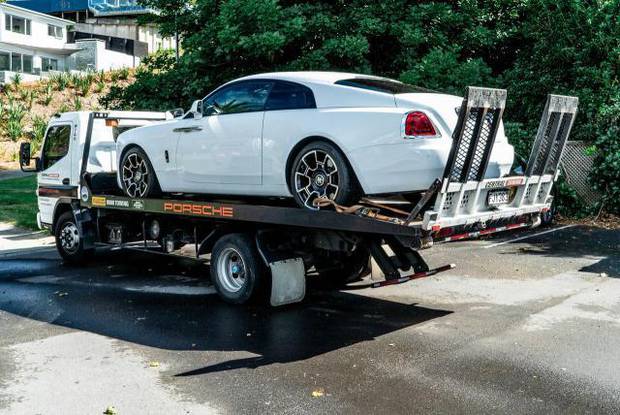
Guyon Foley, Simpson’s defence lawyer, told the High Court his client believed the money was revenue from a concrete business linked to Daniels – essentially he was helping them evade tax, rather than hide the proceeds of other criminal offending.
“He was worked on by some front men. His suspicions were sated as far as [alleged offending of] drugs,” said Foley.
“He thought the money was from cash jobs for concrete pours. It was only later he became suspicious again, and his offending became reckless at that point.”
Twenty letters of support were placed before the court which described Simpson – married for 16 years and father of five – as honourable, well-liked, respectful, kind patient and humble, said Foley.
There was very little financial gain for Simpson, just $18,000, who was not motivated by greed said Foley.
“He asks for mercy.”
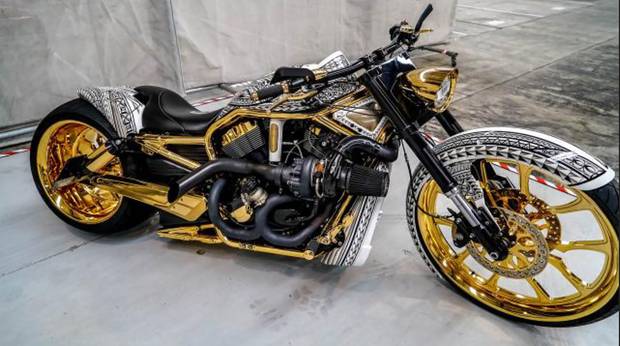
Justice van Bohemen said Simpson was the facilitator of the money laundering scheme, who used his specialist skills and knowledge as a lawyer.
“You made it work. You set up the trusts and lended respectability, as a lawyer, to a criminal organisation.”
Simpson was reckless and brought the legal profession into disrepute, however, the judge was satisfied he was genuine in his remorse.
Despite this, Simpson was sentenced to two years nine months in prison.
“I deeply regret a father being separated from his family. However, that is a consequence of your decisions.”
The surprise admission of guilt made by Daniels and Simpson come as others, including Comanchero president Pasilika Naufahu, maintain their not guilty pleas and head towards a High Court trial next September.
Others arrested in Operation Nova include an accountant and media personality, who both have interim name suppression.
A $10,000 gold chain and a $13,000 Louis Vuitton bag are among the $4m of assets seized in April, including the $1.6m home in the exclusive east Auckland suburb of Bucklands Beach where Naufahu – who has pleaded not guilty to all charges – was living.
At the time of the arrests, Detective Superintendent Greg Williams said the Comancheros used wealth to market themselves.
“We are determined to strip them of that wealth that we allege has come from criminal offending, and take the profit out of it.”
The raids across Auckland was the second termination phase of Operation Nova, an investigation into the gang, the alleged importing of drugs into the New Zealand and the laundering of millions of dollars.
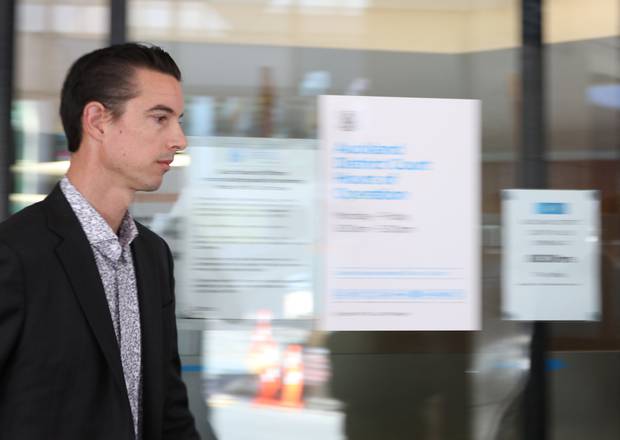
The first phase of Operation Nova was announced in February with no mention of any links to the Comanchero.
Customs officers found 5kg of methamphetamine hidden inside cooking appliances, leading police to find another 6kg of the Class-A drug.
Four people were arrested in Auckland; a 50-year-old New Zealander, a 33-year-old Chinese national, a 60-year-old Canadian national and a 19-year-old from the United States.
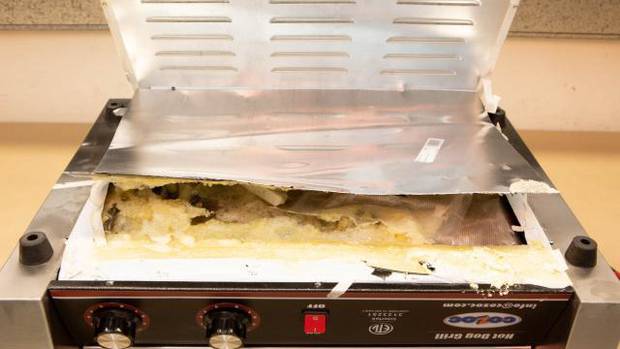
Police believe the methamphetamine was smuggled from the United States, which in turn is likely to have been manufactured in Mexico by cartels.
The Canadian man arrested had a son living in Fiji, where two detectives from the National Organised Crime Group were sent to work with local police.
They found 39kg of cocaine at one address in Suva with a street value of around $20 million.
Then following the Operation Nova raids in April, a New Zealander living in Sydney was arrested by Australian Federal Police.
The 40-year-old was extradited earlier this year over 23 charges for drug importation and supply, participating in an organised criminal group, and money laundering.
Operation Nova terminated about 12 months after the Comanchero publicly announced their arrival on social media.
Wearing the black and gold colours, six members gathered around gold-plated motorcycles in a series of photographs posted online
“All done and sworn in…welcome aboard to my brothers in New Zealand,” says the Instagram post by an Australian member of the Comancheros.
“Another Comanchero chapter opened up. We growing stronger and stronger.”
The display was a powerful statement – to the police and other gangs in New Zealand – which came a week after the ex-president of the Comanchero MC, Mahmoud “Mick” Hawi, was fatally gunned down in a Sydney gym car park.
A New Zealand chapter was “inevitable” following the deportation of 14 Comancheros, Williams told the Herald on Sunday at the time.
They were among the “501” deportees – so nicknamed because of the “character grounds” section of the immigration law used to remove them from Australia.
“It’s concerning. Like the other Australian motorcycle clubs, the Rebels and the Bandidos, we expect the Comanchero will attempt to establish themselves in the drug market within New Zealand,” said Williams.
Given some of the extreme violence between rival Australian MCs which can spill into the public, Williams acknowledged the potential for the same to happen here.
“The reality of gang life, whether it’s seen by the public or not, is one of violence. When dealing with the gangs, we’re finding people with all sorts of firearms,” Williams said last year.
“And there is friction when gangs try to move into an established drug market. So there may be [violence] that comes out of this. To date, there hasn’t been.
“It will be interesting to see what happens.”
A month later, in April 2018, an Auckland man was shot in the head in an execution-style killing on the orders of the Comanchero MC.
Epalahame Tu’uheava and his wife were both shot several times in Māngere.
Tu’uheava, a 28-year-old father also known as Hame or Abraham, died within minutes.
His wife survived by playing dead, despite being shot twice in the head.
Viliami Taani, a Comancheros member described by Yolanda as the “main guy”, has admitted charges of murder and attempted murder and will serve a minimum of 17 years 6 months behind bars.
This year, Tauranga has been rocked by tit-for-tat shootings between the Mongols, another Australian gang, and the local chapter of the Mongrel Mob.
Nearly 100 rounds from semi-automatic rifles were fired at one house in which five children were living inside at the time.
Make Sure You are Subscribed to our Facebook page!
Source: NewsTalk ZB
